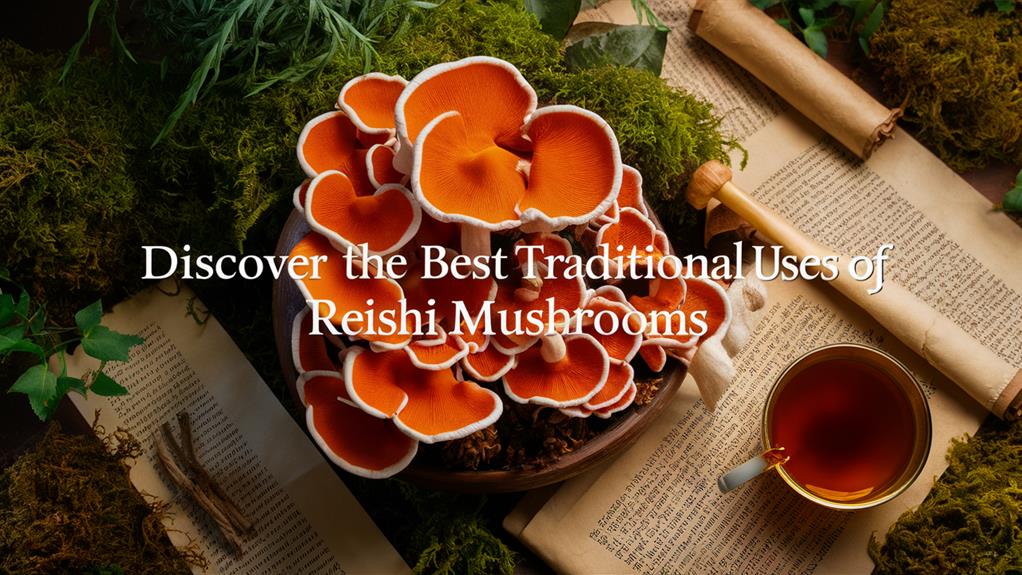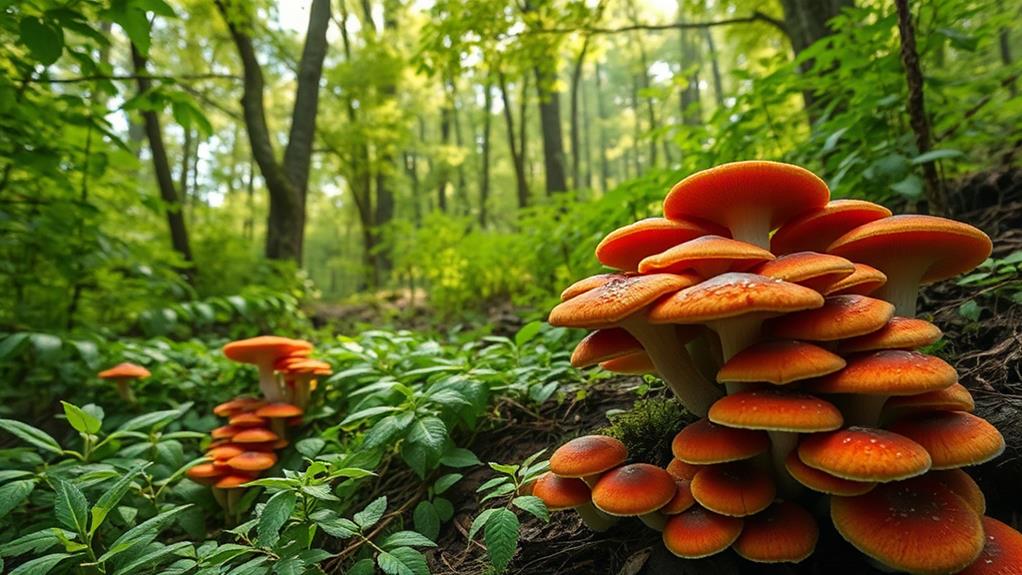
Reishi mushrooms, known as the "mushroom of immortality," offer many traditional health benefits. They enhance your immune system by boosting white blood cell activity and reduce inflammation. You'll find that they help relieve stress and improve sleep quality, making them great for emotional balance. People use reishi to support cancer treatment by alleviating fatigue and enhancing recovery. They also help manage blood pressure and regulate cholesterol, promoting heart health. Additionally, reishi mushrooms support cognitive function and provide powerful antioxidant properties. With such a rich history, exploring their uses can lead to even more health advantages.
Immune System Enhancement

Reishi mushrooms, scientifically known as Ganoderma lucidum, are powerful allies for enhancing your immune system. These medicinal fungi have been used for over 2,000 years, recognized for their ability to support overall health.
Recent studies indicate that health benefits of mushrooms extend beyond immunity, highlighting their potential in reducing inflammation and oxidative stress. One of the key ways Reishi boosts your immune system is by promoting the activity of white blood cells, which are crucial in defending against pathogens.
Research shows that Reishi supplementation can increase white blood cell counts, especially in people undergoing treatments for conditions like colorectal cancer. This suggests that Reishi has immune-stimulating effects that might help your body fight infections better.
The polysaccharides in Reishi, particularly beta-glucans, play an essential role in this process. They modulate your immune response, ensuring it's balanced and effective.
Additionally, Reishi contains bioactive compounds called triterpenes, which help reduce inflammation, further enhancing your immune function.
By incorporating Reishi into your routine, you can tap into its potential benefits for your immune system. Whether as a supplement or in your diet, Reishi mushrooms could be a valuable addition to your health regimen.
Embrace their power and support your body's defenses naturally.
Stress Reduction and Sleep Aid
As you navigate the challenges of daily life, incorporating reishi mushrooms into your routine can help alleviate stress and improve your sleep quality. Known for their adaptogenic properties, reishi mushrooms assist your body in managing stressors more effectively.
In traditional medicine, these mushrooms have earned a reputation as the "mushroom of immortality," valued for their calming effects and ability to support emotional balance. Moreover, their rich antioxidant content may enhance your immune system, further contributing to overall well-being and stress resilience, highlighting the nutritional benefits of these remarkable fungi.
Research supports reishi's role as a natural sleep aid. A study showed that participants experiencing sleep disturbances had significantly improved sleep quality after taking reishi supplements. This effect is likely due to triterpenes, compounds found in reishi mushrooms that promote relaxation and reduce anxiety levels.
Regular consumption of reishi can also help decrease symptoms of neurasthenia, which is a condition marked by fatigue and emotional distress. By incorporating reishi mushrooms into your diet, you may find yourself feeling more relaxed and better equipped to handle stress.
Whether you choose to enjoy them in tea, capsules, or as a powder, the benefits of reishi mushrooms for stress reduction and sleep enhancement are well worth considering.
Cancer Treatment Support

Incorporating reishi mushrooms into your wellness routine not only aids in stress reduction and sleep enhancement but also offers potential support for cancer treatment. Traditionally used in Chinese medicine, reishi mushroom extract has gained attention for its ability to boost the immune system, which is crucial for individuals facing cancer.
Research shows that reishi may help induce cancer cell death and improve the activity of white blood cells, especially in patients with prostate and colorectal cancers. A notable study from 2006 revealed that colorectal cancer patients who consumed reishi experienced an increase in white blood cell count, highlighting its immune-modulating properties.
This can be vital during chemotherapy, as it often weakens the immune response. Furthermore, reishi mushrooms may alleviate fatigue and anxiety, which many cancer patients face, contributing to improved mental well-being during treatment.
The polysaccharides and triterpenes found in reishi are believed to play key roles in its anti-cancer effects. Ongoing studies are exploring how these compounds work to support human health.
Blood Pressure Management
Managing blood pressure can be challenging, but incorporating reishi mushrooms into your wellness routine might offer a natural solution. Known scientifically as Ganoderma lucidum, these mushrooms have been used in traditional Asian medicine to aid in managing high blood pressure.
Studies suggest that reishi may help lower both systolic and diastolic blood pressure, although individual results can vary. Additionally, reishi mushrooms are part of a broader array of quality products that promote health and wellness.
The health benefits of reishi mushrooms come from their bioactive compounds, such as triterpenes and polysaccharides. These compounds are believed to promote vasodilation, which means they help widen blood vessels, improving blood circulation in your body.
In traditional Chinese medicine, reishi is valued as a tonic that supports heart health, indirectly benefiting blood pressure regulation.
While there's some clinical evidence supporting reishi's effectiveness in managing blood pressure, it's important to remember that more research is needed. The optimal dosages and specific outcomes aren't fully established yet.
However, adding reishi mushrooms to your diet could be a beneficial step toward better cardiovascular health, helping you take control of your blood pressure in a natural way.
Cholesterol Regulation

When it comes to cholesterol regulation, reishi mushrooms could play a helpful role.
Research suggests that certain compounds in reishi may boost "good" HDL cholesterol and limit cholesterol production in the liver.
While some studies show mixed results, adding reishi to your diet might support your heart health efforts alongside other treatments.
Mechanism of Action
While research is still ongoing, reishi mushrooms show promise in regulating cholesterol levels through their unique compounds, particularly ganoderic acids. These compounds may help inhibit cholesterol synthesis in your body and contribute to better lipid regulation. Some studies have even reported an increase in HDL, the "good" cholesterol, in those using reishi.
Here are some key points about reishi mushrooms and cholesterol regulation:
- Ganoderic acids may lower overall cholesterol levels.
- Bioactive polysaccharides and triterpenes offer antioxidant benefits.
- Anti-inflammatory effects may improve cardiovascular health.
- Individual responses to reishi can vary significantly.
- Consulting healthcare professionals is recommended for personalized advice.
Despite these potential benefits, it's important to note that a 2016 study found no significant effect on overall lipid levels. This highlights the need for more rigorous research to fully understand how reishi mushrooms can support cholesterol management.
As you explore reishi for its cholesterol-regulating properties, remember that personal results can differ. Taking a well-informed approach, with guidance from healthcare experts, will help you make the best choices for your health journey.
Clinical Evidence Summary
Clinical studies on reishi mushrooms reveal a mixed bag regarding their potential to lower cholesterol levels. Researchers have looked into the cholesterol-lowering effects of the reishi mushroom, especially among diabetic populations. However, results vary widely.
For instance, a 2016 study found no significant impact on fasting blood sugar or hemoglobin A1c levels, which indicates that the effects on cholesterol might depend heavily on individual health conditions.
Some studies have pointed to ganoderic acid derivatives in reishi as possible inhibitors of cholesterol synthesis. Yet, more comprehensive clinical trials are necessary to determine their effectiveness.
These mixed findings suggest that while reishi mushrooms might've some potential benefits, they aren't guaranteed.
If you're considering adding reishi to your regimen, especially if you have existing metabolic conditions, it's wise to monitor your blood lipid levels. This step will help you understand how reishi affects your cholesterol and overall health.
Pain Relief for Shingles
When dealing with shingles, you might find that reishi mushrooms can help ease the pain that comes from the herpes zoster virus.
These mushrooms contain compounds that may reduce inflammation and support your immune system, potentially making your recovery smoother.
While some studies hint at their effectiveness, more research is needed to confirm how well they work and the best way to use them.
Mechanism of Action
Reishi mushrooms play a significant role in alleviating pain associated with shingles outbreaks through their bioactive compounds.
These compounds, like triterpenes and polysaccharides, can be quite effective in reducing inflammation and enhancing your body's immune responses.
Here's how they work:
- Modulate immune responses: They help your body fight off the virus that causes shingles.
- Inhibit virus replication: By slowing down the virus's ability to multiply, they can lessen symptoms.
- Reduce nerve pain: Some studies suggest reishi extract may ease postherpetic neuralgia, a common pain following shingles.
- Lower cytokine levels: Their anti-inflammatory properties can decrease the elevated cytokines during shingles flare-ups, which are responsible for much of the pain.
- Improve overall quality of life: Many users report feeling better overall when incorporating reishi into their routine.
Clinical Evidence Overview
Numerous studies have explored the effectiveness of reishi mushrooms in providing pain relief for shingles, highlighting their potential as a valuable adjunct to standard treatments.
Research shows that reishi mushrooms, specifically the polysaccharides and triterpenes they contain, may have significant analgesic effects. These compounds can reduce inflammation, which is crucial for easing the pain associated with shingles outbreaks.
In a clinical trial, patients using reishi extract reported a notable decrease in pain levels compared to those receiving only standard care. This suggests that reishi mushrooms can complement traditional treatments effectively.
Additionally, the immune-modulating properties of reishi might help manage underlying causes of shingles pain, like nerve inflammation and immune response.
While the evidence is promising, it's important to note that further clinical trials are needed to establish definitive guidelines and confirm the efficacy of reishi mushroom for shingles-related pain relief.
If you're considering reishi as part of your treatment plan, it's essential to consult with a healthcare professional. They can guide you on the best approach and help ensure that you receive comprehensive care tailored to your needs.
Respiratory Health Improvement

For those seeking natural ways to enhance respiratory health, reishi mushrooms offer a promising solution. Traditionally, these mushrooms have been used to support lung function by reducing inflammation and promoting bronchodilation. This can alleviate symptoms of asthma and bronchitis, making breathing easier for many.
Consider the benefits of incorporating reishi mushrooms into your routine:
- Reduces inflammation in the respiratory system
- Enhances immune responses to prevent infections
- Suppresses coughing for improved comfort
- Supports lung function in chronic respiratory conditions
- Tonifies the lungs, especially during cough and fatigue
The bioactive compounds in reishi, like triterpenes and polysaccharides, play a crucial role in these benefits. A study even highlighted that reishi extracts could improve overall lung function, which is essential for those with chronic issues.
In Traditional Chinese Medicine, reishi is often recommended for conditions such as chronic cough and shortness of breath. Regular consumption can also help individuals exposed to pollutants and allergens, further showcasing the reishi mushroom's positive impact on respiratory health.
Antioxidant Properties
Rich in antioxidants, reishi mushrooms (Ganoderma lucidum) play a significant role in combating oxidative stress and protecting your cells from damage caused by free radicals. These powerful fungi contain polysaccharides and triterpenes, which are key components contributing to their notable antioxidant properties.
By enhancing the activity of antioxidant enzymes, reishi mushrooms help your body neutralize free radicals, reducing the risk of cellular damage.
Animal studies have demonstrated that reishi mushroom supplementation can lower markers of oxidative stress, indicating an improvement in your body's natural defense mechanisms. This reduction is vital, as oxidative stress is linked to various chronic diseases, including cancer and cardiovascular disorders.
By incorporating reishi mushrooms into your diet, you may not only support your overall health but also potentially ward off these serious health issues.
Incorporating reishi into your routine can be a proactive step towards safeguarding your well-being. With their impressive antioxidant properties, reishi mushrooms offer a natural way to combat the harmful effects of oxidative stress, ultimately promoting longevity and a healthier life.
Mental Clarity and Focus

When it comes to enhancing mental clarity and focus, reishi mushrooms can really step up to the plate. Traditionally used in Eastern medicine, reishi has been known to alleviate symptoms of neurasthenia, leading to better cognitive function and reduced fatigue.
The bioactive compounds in reishi, like triterpenes and polysaccharides, support overall brain health, helping you stay sharp and attentive.
Here are some benefits of reishi mushrooms for mental clarity and focus:
- Improves cognitive function: Helps maintain sharpness in thinking.
- Reduces anxiety: Lowers stress levels, allowing for better concentration.
- Supports emotional balance: Mood-stabilizing properties can enhance mental clarity.
- Offers adaptogenic qualities: Helps your body adapt to stressors effectively.
- Boosts overall well-being: Enhances your ability to maintain focus throughout the day.
Incorporating reishi mushrooms into your routine might just provide that mental boost you're looking for.
With its ability to reduce anxiety and support brain health, it's a natural choice for anyone striving for improved mental clarity and focus.
Longevity and Vitality Promotion
Reishi mushrooms have a rich history in traditional medicine, often called "the mushroom of immortality" for their role in promoting longevity and vitality.
Research today backs up these ancient claims, showing that the bioactive compounds in Reishi can enhance your immune function and help reduce stress, which is vital as you age.
Historical Significance in Medicine
For centuries, people have turned to reishi mushrooms, known scientifically as Ganoderma lucidum, as a powerful ally in the quest for longevity and vitality. Revered in Traditional Chinese Medicine, these medicinal mushrooms have a rich historical significance that dates back over 2,000 years.
Ancient texts, like the Shen Nong Ben Cao Jing, detail their properties, emphasizing their role in enhancing vital energy (Qi) and promoting well-being.
Here's why reishi holds a special place in history:
- Often called the "mushroom of immortality" due to its association with longevity.
- Historically rare, making reishi a symbol of status and health among nobility.
- Known for providing immune support and stress relief.
- Linked to emotional balance, enhancing overall vitality.
- Supported by emerging scientific research that validates ancient claims.
As you explore the legacy of the reishi mushroom, you'll discover its esteemed reputation as a health panacea.
This historical significance not only highlights its benefits but also reflects a continuous journey toward understanding vitality through nature's wisdom. By appreciating its past, you can better understand its role in promoting your health today.
Modern Longevity Research Insights
Recent studies on longevity and vitality have spotlighted the remarkable benefits of reishi mushrooms, underscoring their potential to enhance health and well-being. One of the key findings is their immunomodulating effects, which can improve your overall health and boost your resistance to diseases. This is particularly important as we age.
Research shows that the bioactive compounds in reishi, like triterpenes and polysaccharides, help reduce oxidative stress, a major factor in aging and chronic diseases. Additionally, reishi's anti-inflammatory properties may alleviate chronic inflammation, which often leads to health decline in older adults.
Another exciting area of study is reishi's role in supporting cardiovascular health. It might lower blood pressure and improve lipid profiles, contributing to increased vitality as you age.
Moreover, clinical studies suggest that reishi can enhance mental clarity and reduce fatigue, promoting a higher quality of life.
Incorporating reishi mushrooms into your routine could be a powerful step toward not only living longer but also enjoying a healthier, more vibrant life. The growing body of research continues to reveal just how valuable these mushrooms can be for your longevity journey.
Conclusion
Incorporating reishi mushrooms into your wellness routine can be a game changer for your health. From boosting your immune system to supporting stress relief, these mushrooms have a long history of traditional use that stands the test of time, like the trusty flip phone that still holds sentimental value. By exploring their many benefits, you can enhance your overall well-being and promote longevity. So why not give reishi a try and see how it can positively impact your life?
